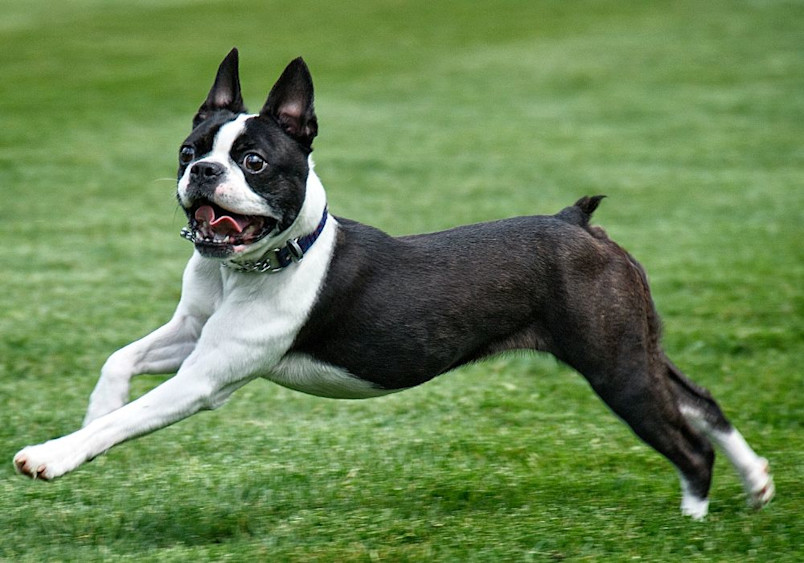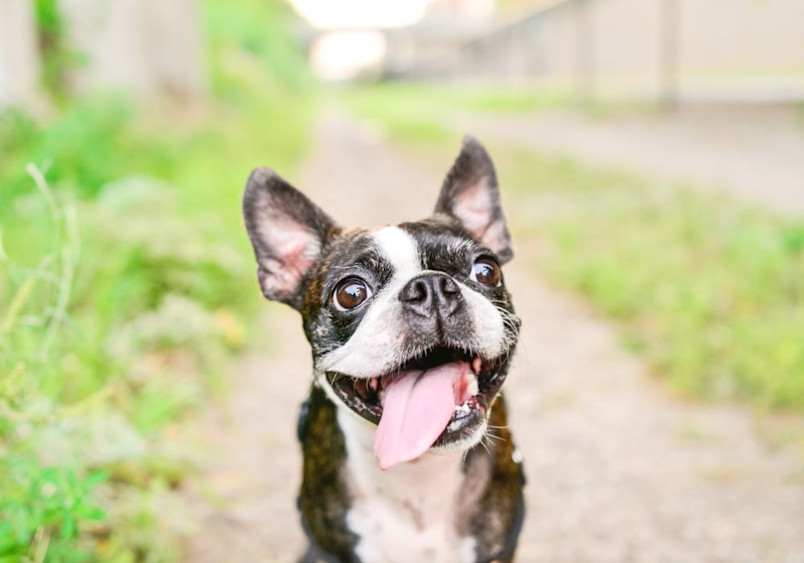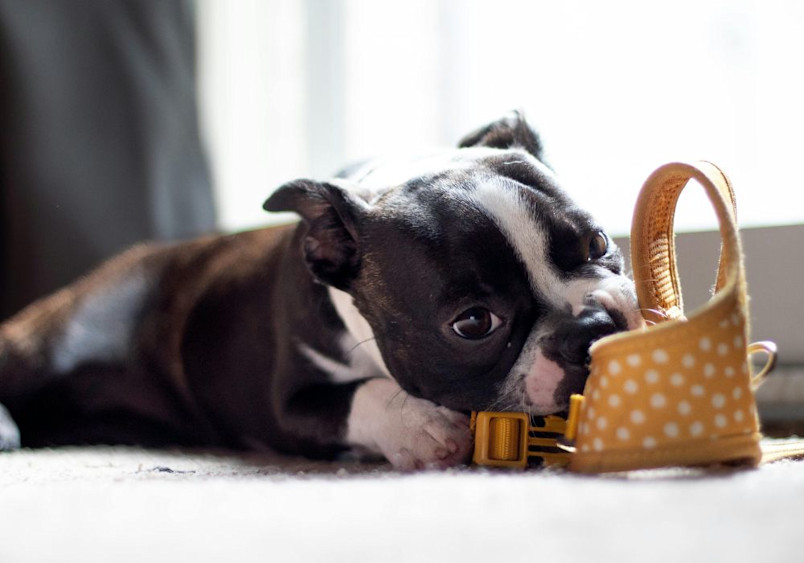
Looking for a dog that combines charm, intelligence, and a touch of elegance? Say hello to the Boston Terrier, a pint-sized powerhouse of affection and energy that’s as dapper as they come. Dubbed the “American Gentleman” for their signature tuxedo-like markings and courteous demeanor, these lovable dogs are perfect for families, singles, and seniors alike.
Whether it’s a spirited play session, a snuggle on the couch, or a brisk walk through the neighborhood, the Boston Terrier is up for it all—always with a wagging tail and a twinkle in their expressive eyes. They’re adaptable, fun-loving, and endlessly loyal, making them an ideal addition to any household.
In this guide, we’ll uncover everything you need to know about the Boston Terrier—from their fascinating history and charming quirks to tips on training, health, and care.
Quick Facts About Boston Terriers
Name: Boston Terrier, American Gentleman, Boston Bull Terrier
Origin: United States (Boston, Massachusetts)
Size: 15-17 inches tall; 10-25 pounds
Lifespan: 11-13 years
Appearance: Tuxedo-like coat in black, brindle, or seal with white markings
Temperament: Friendly, intelligent, adaptable, and affectionate
Compatibility: Great with families, singles, and seniors; good with other pets
Intelligence: Highly intelligent and quick to learn
Exercise & Energy: Moderate activity level; enjoys playtime and walks
Grooming Needs: Low maintenance; occasional brushing and nail trims
Training: Quick learners but benefit from consistent, positive reinforcement
Health: Prone to respiratory and eye issues
Highlights: Adaptable, loving, and great for first-time dog owners
What Makes the Boston Terriers Great
Perfect for Small Spaces: Their compact size and adaptable nature make them ideal for apartment living. Boston Terriers don't need a lot of space to thrive, and their moderate exercise needs can be met with daily walks and indoor play sessions.
Family-Friendly: These gentle companions bond deeply with their people and are especially good with children. Boston Terriers have a patient nature that makes them excellent family dogs, and they typically get along well with other pets.
Minimal Grooming: Boston Terrier grooming is refreshingly simple thanks to their short, sleek coat. Weekly brushing, occasional baths, and basic maintenance are all these dapper dogs need to stay looking their best.
Smart and Trainable: Their intelligence and eagerness to please make Boston Terriers wonderfully trainable companions. These quick learners respond well to positive reinforcement, making them an excellent choice for first-time dog owners.
Playful and Affectionate: Boston Terriers thrive on human companionship and love being the center of attention. Their playful spirit and affectionate nature make them perfect for families seeking an engaged, loving pet who can match their energy levels, whether that means active play or quiet cuddle time.

How to Recognize a Boston Terrier The Boston
Terriers are instantly recognizable by their square heads, upright ears, and short sturdy frames. Their distinctive look is what sets them apart from other small breeds. Their signature tuxedo-like markings and compact, muscular build create an immediately recognizable silhouette that's both elegant and sturdy. These dapper dogs carry themselves with a confident, gentle air that matches their friendly personalities.
Boston Terrier Size
Adult Boston Terriers typically stand 15-17 inches tall and weigh between 10-25 pounds, with males usually being slightly larger than females. Their compact size makes them perfect for both city living and suburban homes, while still being sturdy enough for active play. Despite their small stature, Boston Terriers are well-muscled and athletic, capable of both spirited play sessions and peaceful cuddles on the couch.
Boston Terrier Coat Colors
Boston Terriers sport a short, smooth coat that comes in several striking colors. The most common colors they have include black with white markings, but they also appear in seal (reddish-brown) and brindle. All color variations feature the breed's characteristic white markings on the face, chest, and often the legs, creating their signature tuxedo look.
Boston Terrier Behavior
Boston Terriers are known for their gentle, friendly nature and adaptable personalities. These dogs excel at reading their owners' moods and can adjust their energy levels, accordingly, making them suitable for various households and lifestyles.
What is the Personality of a Boston Terrier?
The Boston Terrier's personality is a delightful blend of playful energy and calm affection. These dogs are known for their keen sense of humor and love of play, but they're equally content to cuddle quietly with their favorite humans. Boston Terriers are alert and intelligent, making them great companions who can adapt to their owner's lifestyle while maintaining their charming, sometimes silly personalities.
Do Boston Terriers Get Along Well with Children and Family?
Boston Terriers shine as family dogs, especially with children who know how to handle them gently. Their patient nature and sturdy build make them ideal playmates for kids, while their sensitive temperament helps them form strong bonds with all family members. These dogs are particularly good at matching the energy levels of their human companions, whether that means an active play session or a quiet afternoon nap.
Boston Terriers with Other Pets
Most Boston Terriers get along well with other pets, including both dogs and cats. Their friendly nature usually extends to other animals, though early socialization helps ensure positive relationships. While they may occasionally show a stubborn streak, they typically prefer making friends to picking fights, living up to their "gentleman" nickname.
How to Care for Your Boston Terrier
Keeping your Boston Terrier healthy and happy requires attention to their specific needs. While they're generally low-maintenance dogs, understanding their care requirements ensures they stay in top condition.
Grooming Needs of a Boston Terrier
Boston Terriers are among the easier breeds to groom, thanks to their short, smooth coats. Weekly brushing with a soft-bristled brush or grooming mitt helps remove loose hair and keeps their coat shiny. These dogs don't require professional grooming unless desired, though they do need regular nail trimming, ear cleaning, and dental care like all dogs.
Are Boston Terriers Easy to Train?
Training a Boston Terrier puppy is typically a rewarding experience, as these intelligent dogs are eager to please their owners. Starting with basic commands like teaching your dog to sit, these quick learners respond well to positive reinforcement methods and can excel in various dog sports and activities. Early socialization and consistent, gentle training help develop their natural good manners into reliable behaviors.
Living Needs of a Boston Terrier
Boston Terriers adapt well to various living situations, from apartments to large homes. They need moderate daily exercise, typically satisfied with a couple of brisk walks and play sessions. However, their flat faces make them sensitive to extreme temperatures, so they should be kept cool in summer and warm in winter.
Feed Your Boston Terrier the Right Way
Maintain your Boston Terrier's healthy weight through measured portions of high-quality dog food appropriate for their age, size, and activity level. Make sure they thrive on a balanced diet rich in protein, healthy fats, and essential nutrients. These dogs can be prone to weight gain, so monitoring their food intake and treating in moderation helps prevent obesity-related health issues.
Common Health Issues of Boston Terrier
While Boston Terriers are generally healthy, their flat faces (brachycephalic structure) can make them prone to certain health issues, including breathing difficulties. Regular vet checkups and a healthy lifestyle are vital to their well-being.
What Health Issues Do Boston Terriers Commonly Encounter?
Brachycephalic Syndrome
Your Boston's adorable flat face can come with some breathing challenges. You'll want to monitor their breathing, especially during exercise or hot weather. If you notice excessive snoring, difficulty exercising, or sensitivity to heat, check with your vet – sometimes surgery might be needed to help them breathe more comfortably.
Eye Problems
Boston Terriers can develop various eye conditions, including cataracts, corneal ulcers, and glaucoma. Their prominent eyes need protection from injury and regular checking for any signs of problems. Early detection and treatment of eye issues helps prevent more serious complications.
Patellar Luxation
If your Boston occasionally hops or skips while walking, their kneecap might be slipping out of place – a condition called patellar luxation. Keeping your pup at a healthy weight helps reduce strain on their knees. Your vet can recommend the best treatment plan, from simple management to surgery if needed.
Allergies
Boston Terriers can be sensitive to both environmental factors and certain foods, making them prone to skin irritations and digestive issues. Watch for common allergy symptoms like excessive scratching, licking, red or inflamed skin, and digestive upset, as these can signal that your Boston is reacting to triggers such as grass, pollen, or certain protein sources in their diet. Regular grooming and working with your veterinarian to identify specific triggers can help manage allergy symptoms and keep your Boston Terrier comfortable.
Protect Your Boston Terrier’s Health by Getting Pet Insurance
Pet insurance is an important consideration for Boston Terrier owners due to the breed's predisposition to certain health conditions. These conditions can lead to unexpected and substantial veterinary expenses.
For example, patellar luxation, a common knee problem in Boston Terriers, can require surgical correction. This surgery can range in cost from $1,500 to $3,000 per knee, depending on the severity and the surgical technique used. This means that if both knees are affected, the cost could easily reach $6,000. These kinds of unexpected costs can put a significant strain on a family's budget. Pet insurance can provide a financial safety net, helping you ensure your Boston Terrier receives the best possible care without the added stress of financial burden.
Choose a reliable dog insurance plan that offers protection for the breed-specific conditions your Boston Terrier might face. It’s also important to understand how pre-existing conditions are handled. The best time to enroll your Boston Terrier is when they're a healthy puppy, before any conditions develop.
By investing in pet insurance early, you can ensure your furry friend receives the best possible care throughout their life without worrying about financial constraints. Remember, you can't predict what health challenges your pet might face, and pet insurance is something you want to have before you need to use it.

The Origin of Boston Terrier
The Boston Terrier's story began in the late 1800s in Boston, Massachusetts, leading to their status as one of the first breeds developed in America. Originally bred from a mix of English Bulldogs and white English Terriers, these dogs were initially larger and bred for fighting. However, selective breeding transformed them into the smaller, gentler companions we know today.
The breed gained recognition from the American Kennel Club in 1893, making them one of the first American breeds to receive official status. Their popularity grew steadily, particularly among city dwellers who appreciated their manageable size and adaptable nature. Today's Boston Terriers are as charming as ever, with a fun-loving yet gentle personality.
Getting a Healthy Boston Terrier
Finding your perfect Boston Terrier starts with seeking reputable sources. Avoid pet stores and online retailers that ship puppies without questions – these often support puppy mills that produce unhealthy, unsocialized dogs. Instead, begin your search through the Boston Terrier Club of America, which offers breeder referral services and maintains strict ethical standards for its members.
When working with a breeder, verify they conduct comprehensive health screenings, including OFA clearances for knees, CERF certification for eyes, and hearing tests from either OFA or GDC. Responsible breeders will provide documentation of these tests and welcome questions about their breeding program. They should also offer a written contract that includes health guarantees and a return policy if you're unable to keep your dog. Expect to pay between $1,000-$3,500 for a Boston Terrier puppy from a reputable breeder.
Consider adoption as an excellent alternative. Many wonderful Boston Terriers await homes in breed-specific rescues and shelters. These organizations can provide detailed information about their dogs' personalities and health histories, and adult dogs often come with the advantage of established temperaments and training.
Whether choosing a puppy or adult, schedule a veterinary visit immediately after bringing your Boston Terrier home to establish a preventive care plan, especially focusing on common breed-specific concerns like respiratory, eye, and joint health.
Frequently Asked Questions About Boston Terriers
Are Boston Terriers good apartment dogs?
Yes! Boston Terriers excel in apartment living due to their moderate exercise needs and adaptable nature. Their compact size and generally quiet demeanor make them ideal for smaller living spaces, though they still need regular walks and playtime.
How much exercise does a Boston Terrier need?
Boston Terriers require moderate daily exercise, typically 30-60 minutes split between walks and play sessions. Their flat faces make them sensitive to extreme temperatures, so exercise should be monitored accordingly.
Do Boston Terriers bark a lot?
Generally, Boston Terriers are not excessive barkers. They may alert to visitors or unusual sounds but typically don't engage in nuisance barking. Early training helps reinforce appropriate barking behavior.
Are Boston Terriers easy to train?
Yes, Boston Terriers are intelligent and eager to please, making them relatively easy to train. They respond well to positive reinforcement methods and consistent, gentle guidance.
How long do Boston Terriers live?
The average lifespan of a Boston Terrier is 11-13 years, though some may live longer with proper care and good genetics. Regular veterinary care and maintaining a healthy lifestyle help maximize their years with you.
Why Choose a Boston Terrier?
Boston Terriers make excellent companions due to their loving nature, adaptability, and manageable size. Whether you’re a first-time dog owner or an experienced pet parent, a Boston Terrier can bring joy and laughter into your life.